- Bernard Preston homepage
- Bread
- Solar Electric Breadmaker
Solar electric breadmaker
Solar electric breadmakers are one of those wholly desirable items, in my book, but it is only for the serious greenie; of course, it works on mains-power too.
You are combining two passions; the desire for nutritious delicious food, and making full use of all the gifts Mr Golden Sun brings us. We do not worship him like the ancient Egyptians did but, gosh, I do appreciate his light and warmth.
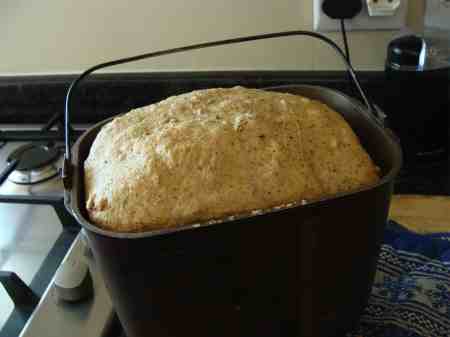
This page was last updated by Bernard Preston on 20th July, 2021.
It is all about becoming more self-reliant, mingled with a profound distrust of what the food industry delivers today; is it any surprise we live in a world full of tumours and autoimmune diseases?
But let's acknowledge that it is a journey, and buying your electric breadmachine and baking several times a week is only the beginning. Then you hear about sourdough and so the next step forward is taken; that's an easy one, all do you do is add a few tablespoons of culture.
Then you keep reading that whole grains are so nutritious and contribute enormously to your well-being, but commercial bread is only made from refined flour.
Why is whole grain better is a profoundly important subject for those who value their well-being. You are far less likely to get macular degeneration, the chief cause of blindness in the elderly for example.
The step up to 100% wholemeal flour is quite a leap not into the future but backwards into the millennia when they baked their bread the best way; so that it tastes and is better.
Using a solar electric breadmaker just makes it cheaper; the price of energy is escalating alarmingly every year.
- Bernard Preston homepage
- Bread
- Solar Electric Breadmaker
Commercial loaves today are so loaded with crap; excuse my French. They add a whole variety of chemicals; one of them, called a transglutaminase, actually causes the intolerance to wheat that bugs so many in our society.
The other is an amino-acid in gluten called
proline; the solution is to bake sourdough bread; it is easy. The
lactobacilli digest the stubborn proteins.
Then there are all the preservatives and flavour-enhancers; just the read the label for yourself.
Now a loaf of white is pretty cheap really, but if you want decent bread you can expect to pay a royal sum; baking at home is certainly a cost-effective option. It costs me R6 to bake a loaf and I sell it for R45; and because no one else uses 100% flour there is no competition. That is about three dollars.
What puts most folk off is how long it takes to knead and prepare a loaf; enter the modern world with its amazing machines.
Twiddle the paddle
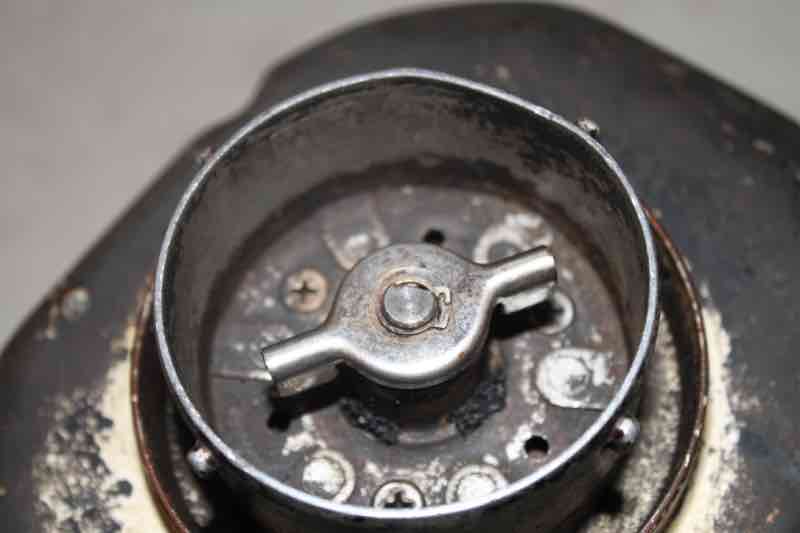
There are two good reasons why you should put your hand under the baking-tin and twiddle the paddle before placing it into the solar electric breadmaker.
The sourdough culture needs to be spread through the flour.
And secondly when the baking-tin gets old the paddle can jam. Then the motor tries to force it and bingo your oven is kaput. I've just had to remove those three screws you can see, take out the mechanism and free it up. It's important; our very old machine died this way, no spares available. It broke my heart but had to dump my ancient friend; must have baked over 5,000 loaves of very special bread.
Solar power energy
Solar power energy is free.
And of course you have to cost in the electricity if you are concerned about the price; enter Mr Golden Sun and the free energy he brings to those who are crazy enough to trust any who come bearing gifts; beware of the Greeks, though!
He does not just warm your body; there's electricity too if you can collect it. Sunlight contains many different parts of the electromagnetic spectrum and one of them, by using a photovoltaic panel, can be turned into useful energy that can be used in your lights, computers and plug sockets.
In fact, if you have enough panels, you can power your breadmaker, oven and even the dishwasher.
Our solar electric breadmaker is used on four times a week, and refrigeration using solar power occurs throughout the day; at night we switch over to the utility.
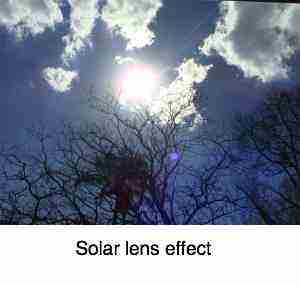
Solar electric breadmaker
Your solar electric breadmaker works on mains power too; your own staff of life machine is so easy and cheap too.
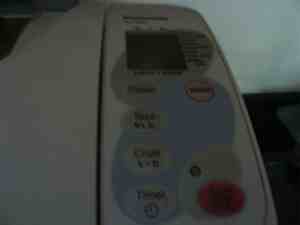
This page is not about the virtues of different breadmakers but I notice that the Telegraph lists a new version of our ancient Panasonic electric breadmaker top of the pops. Use it on solar and you have the perfect combo.
Our Panasonic above is thirty-years old and has worked all this time without a hiccup, until the paddle jammed recently, but it is now rather pricey; actually I wouldn't buy the one with all the bells and whistles. They come today with fancy electronics and umpteen settings. I use only one. If you want fresh bread in the morning, then you need a timer, but in fact I never use it.
There is only one important feature to my mind; it must have a five-hour cycle. The longer the dough cures, the better the bread. In fact the experts like to leave it in the fridge overnight.
Stop a moment before rushing off to the store for your electric breadmaker; it is apparently the most underutilized appliance in the kitchen. I do not really understand why as it takes me only five-minutes to measure out a little dried yeast, add the flour, salt and honey and a pat of butter; pour in the water and she is away.
In fact unless you are a bit of fruitcake like me, it should only take three-minutes; I also like to grind the 100% flour. Then of course you have to wait five hours for the perfect, delicious overwhelmingly nutritious loaf. If you're worrying about your weight, then you can add a dollop of hummus to reduce the glycemic index; in effect, make it into low GI bread.
If you think 158 dollars is a bit steep for the basic Panasonic model, then there are any number at Amazon that are a lot cheaper; some are really quite compact, which is nice. They are probably made in China; will they still be working in twenty-years?
Butter the paddle
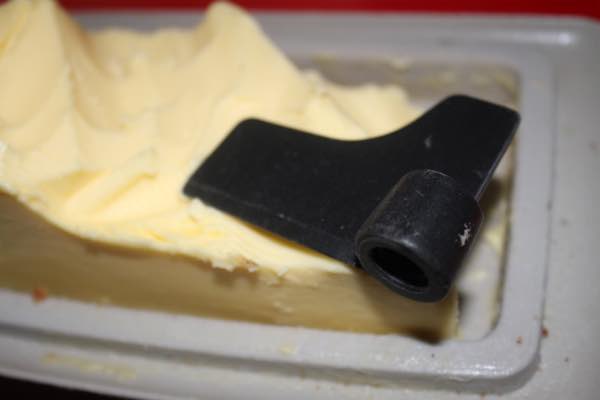
The bread will tend to stick in the oven-dish. Make sure it is absolutely clean and free of remnants of baked dough before adding the ingredients. If you butter the paddle thoroughly, especially around the circular holder, it does help. Actually I don't bother anymore.
Make sure you remove the paddle if it gets stuck in the loaf before starting to slice. Scratches will ruin it for ever. The good wife has donated a darning hook that works like a charm for getting it out.
Wait for the oven dish to cool for ten-minutes before trying to remove the loaf. Wiggle the paddle a few times to loosen it from the loaf if it won't pop out.
Solar
Newsletter
Our newsletter is entitled "create a cyan zone" at your home, preserving both yourself and Mother Earth for future generations; and the family too, of course. We promise not to spam you with daily emails promoting various products. You may get an occasional nudge to buy one of my books.
Here are the back issues.
- Lifestyle and ideal body weight
- What are ultra-processed foods?
- Investing in long-term health
- Diseases from plastic exposure
- Intensive lifestyle management for obesity has limited value
- A world largely devoid of Parkinson's Disease
- The impact of friendly bacteria in the tum on the prevention of cancer
- There's a hole in the bucket
- Everyone is talking about weight loss drugs
- Pull the sweet tooth
- If you suffer from heartburn plant a susu
- Refined maize meal and stunting
- Should agriculture and industry get priority for water and electricity?
- Nature is calling
- Mill your own flour
- Bake your own sourdough bread
- Microplastics from our water
- Alternative types of water storage
- Wear your clothes out
- Comfort foods
- Create a bee-friendly environment
- Go to bed slightly hungry
- Keep bees
- Blue zone folk are religious
- Reduce plastic waste
- Family is important
- What can go in compost?
- Grow broad beans for longevity
- Harvest and store sunshine
- Blue zone exercise
- Harvest and store your rainwater
- Create a cyan zone at your home
Okay, now for the solar part of your electric breadmaker. The roofs of some fruitcakes' homes look like the Martians have landed in the night. Photovolatic panels collect the energy in sunlight and turn it into electricity.
To have it in a suitable form that your electric breadmaker can use you need a few gadgets; read all about it at our solar powered generator page, if you’re interested. You too could have one if you are a serious greenie.
Then the electricity
for your solar electric breadmaker is free, courtesy of Mr Golden Sun. It uses 0.4kWh of electricity; you'll have to look at the statement from your utility company, but in South Africa that would be about 0.3 rand of electricity.
Mind you, if I was to do this all again, I would not put those PV panels on the roof of my home. I would build a separate garage, and use the PVs as the cladding. No roof tiles or corrugated iron would be necessary. See why at the PV pitch page below.
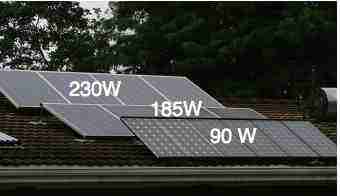
Rather use them to roof your garage.
One big advantage of the solar electric breadmaker is that one generally has surplus power in the middle of the day when it is baking.
Nutritious choice foods
Nutritious choice foods are for those who have a serious desire to require little need of medication, and only an occasional reliance on doctors.
It does mean some changes in what you eat, and the solar electric breadmaker is only a small part of it. In short, it means going back to those supermarket items that your grandmother would recognise as food; sufferin' succotash should regularly be on the menu in the summer months when corn and lima beans are available.
Plenty of fruit and salads, 100-percent whole wheat breads, adequate legumes like beans and peas and garbanzos, and yes maybe a little chili.
White rice has to go completely because of its extremely high glycemic index, read it is very fattening, and cakes and cookies are for high and holy days only.
As we Dutch say, those who won't hear must feel; either make these changes to choice foods or factor in a lot of medical-costs, not to mention pain, into the equation; and often an early demise.
The year of the revolutionary new bread-making machine
Hassan Daoud writes a fascinating book about life in Beirut in the 1960s, a place of the "life and loves, hates and schemes, and desires profound and pedestrian." The story of the bakery, owned by the narrator's father, is in fact a reflection on the traditions lost in our modern world, the values and complexities of humanity when compared with machinery, and the grace and difficulties of kneading and baking a loaf as compared with the ease of mass production.
Making bread back in those days, when time was not an issue, was a grand endeavor, as Darryl Accone says.
I personally was brought up by a Lebanese lady; long before our little bread-machine, I was introduced to the sheer beauty of baking a loaf of bread. If you've never done it that way, got dough sticking to your hands and under your fingernails you have missed something very special; and there is still time to remedy that loss.
Even so, I would not go back to baking that way; our solar electric breadmaker is a gem giving us access to real bread, with a sourdough starter, but not having to spend hours in the hot-kitchen slaving away.
Useful links
When browsing use right click and Open Link in New Tab, or you may get a bad gateway signal.
Bernard Preston
Bernard Preston is a semi-retired DC and self-confessed food nut. He does not like pain and pills and studiously avoids doctors; sharp needles and scalpels are not for him. And he is willing to totally forego junk like sticky, sweet donuts to make it happen; they together with colas and energy drinks are total crap.
He is the one who grinds the wheat-berries and uses the solar electric breadmaker every day; dinkum, it takes only five minutes.
He often grinds the flour ahead of time in the wee small hours, using utility power, when making this more digestible sourdough bread recipe. Actually now that we have lithium batteries that it is no longer necessary. We have used no more than 20kwh of energy from the grid in the last year.
The one exception is a two-monthly blood donation, and alas today is the day. I am not looking forward to it; it still hurts after nearly 50 pints, and I still faint periodically.
We do it for king and country; the time may come when you and I need a source of clean blood.
Did you find this page interesting? How about forwarding it to a friendly book or food junkie? Better still, a social media tick would help.
- Bernard Preston homepage
- Bread
- Solar Electric Breadmaker
Address:
56 Groenekloof Rd,
Hilton, KZN
South Africa
Website:
https://www.bernard-preston.com